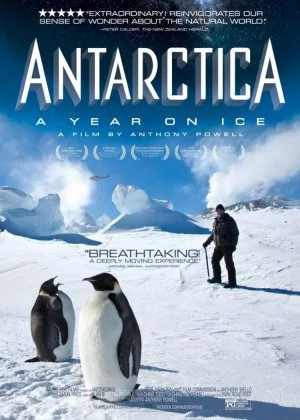Antarctica: A Year on Ice

You may or you may not have noticed, but ever since I started this blog and got to reviewing films, only a single documentary (Chandmani Sum) ever made it onto these pages. Nowadays the documentary "genre" (if you can call it a genre) is quickly gaining both popularity and credibility and after countless near misses and dead ends I finally found one worth reviewing. Antarctica: A Year on Ice is a unique journey to one of the most remote, untouched places on our planet.

Most documentaries are either trying to sell you an idea or they focus on human drama. I'm not particularly fond of either kind. I tend to favor factual documentaries that set out to broaden the understanding of a certain topic. In turn, these documentaries are often a little too stale and functional for me to fully appreciate. Luckily there are exceptions to the rule and Antarctica is one of them. It's factual, it's personal and there is plenty of room for building up a mystic yet grounded atmosphere.
The film isn't so much about the continent of Antarctica as is it about what it means to live there and how we are trying to cultivate and protect it at the same time. Several bases are scattered around the land, each one claimed by a different nation, inhabited by only a handful of people throughout the year. The biggest village is called McMurdo, about 1250 people strong in summer, reduced to a mere 250 in winter. That's where this documentary takes place.
The thing about Antarctica is that you can't really wake up one day and decide to go live there. The people who inhabit the small bases are either there for science or for supporting the base itself. Whether they stay throughout the winter seasons seems more of a personal choice, although that wasn't made entirely clear. In any case, Powell seeks out several different people occupying the McMurdo base and follows them around for an entire year, documenting their experiences.

Part of the strength of the documentary is the wide range of impressions Powell managed to collect, even amongst such a small population. While the continent itself has a major pull, housing many impressive sights and emitting an almost tangible sense of otherworldliness, it quickly becomes clear that living there can also be quite boring. Everybody is there to work and these bases aren't exactly vacation resorts. So while McMurdo might be right in front of an impressive mountain (the perfect setting for gawking at the splendour of nature), the people who live there are sitting inside for 12 hours, no windows in sight, handling phone calls with equipment that looks like it survived there since the 80's.
A Year on Ice isn't just 90 minutes of talking heads though. Powell himself has a soft spot for time-lapse photography and Antarctica proves a perfect location for some amazing lapses. To see the sun shoot around the sky for 24 hours without ever dipping beneath the horizons is quite amazing. To see the stars and Aurora Borealis in winter, when the sun doesn't rise for almost 4 months, is as haunting as it is beautiful.
What I liked best though is that Powell has a great eye for abstract beauty. It's not just simple shots of nature like in most other documentaries, the close-ups of the fiery sky when the sun is setting have a abstract painting-like quality to them. So do the close-ups of the thick icecaps, or the motion patterns of the sea shore when it's slowly freezing over. It's a beautiful way to show nature in motion while creating a very transfixing atmosphere that transcends the factual part of the documentary.

A good film is able to make you love something you'd hate in real life. I'm definitely not the person to go to a cold, barren and far-away place like Antarctica and live there in isolation for a full year, but during these 90 minutes I loved spending time with the people who built up their lives over there. I really got a feel for the place, without ever getting the feeling I was looking at an elaborate advertisement.
Finally, what truly sealed the deal for me was Powell's fair and open approach to its subject. With the material at hand, it would've been so easy to push through an eco-message, or a commentary about how humans mess up our planet. And it's not that Powell strays away from those subjects, they are mentioned once or twice when appropriate, but it never felt forced or preachy. The effect is all the better for it.
Antarctica: A Year on Ice is a template for what I look for in a good documentary. It's factual, it's fair and it has strong filmic qualities. It's able to condense the feeling of spending a year on Antarctica in 90 minutes without ever feeling rushed or half-arsed. Kudos to Powell and the people who were involved with this documentary (both in front and behind the camera), because they did a mighty fine job.